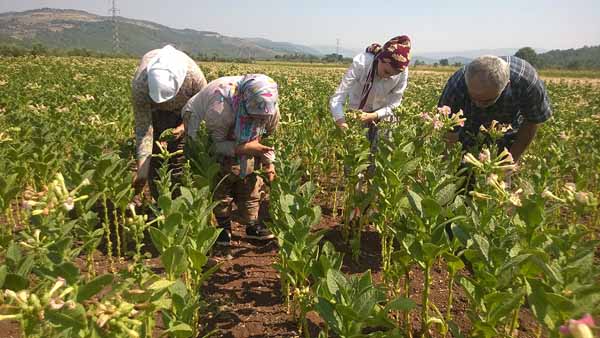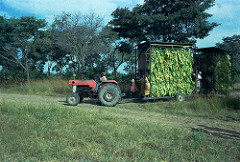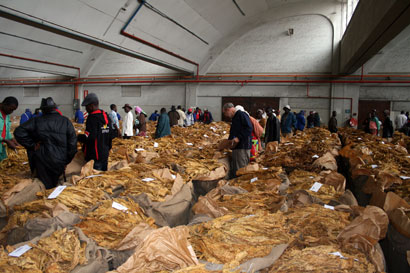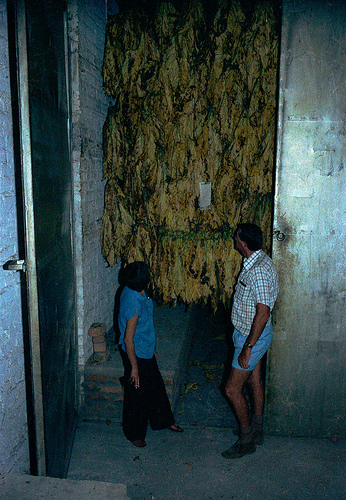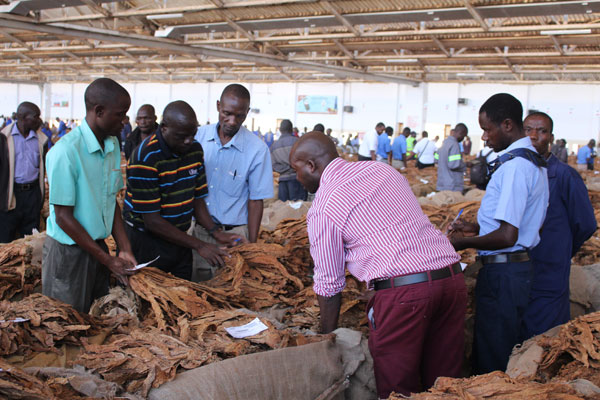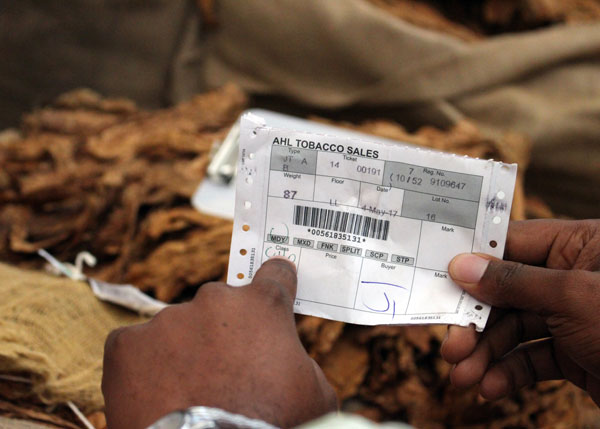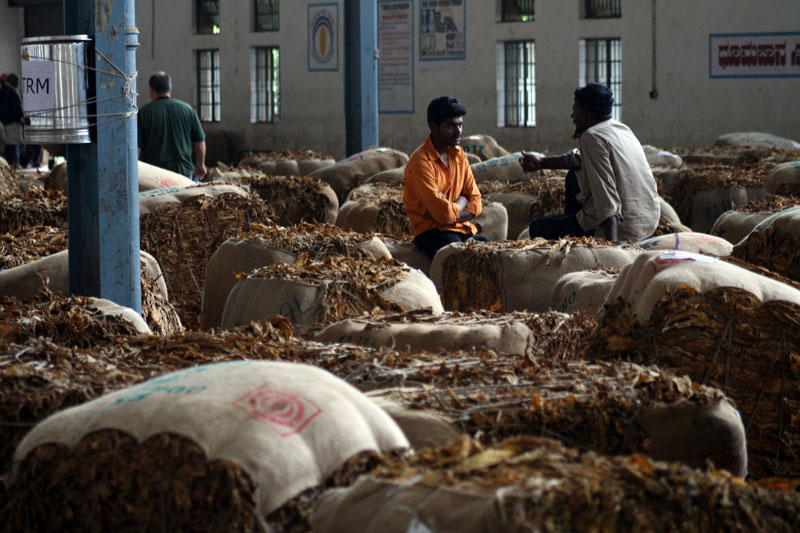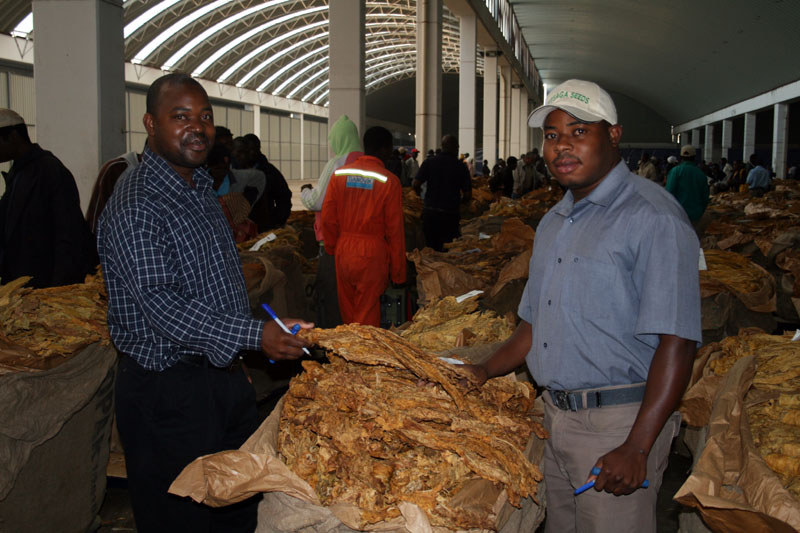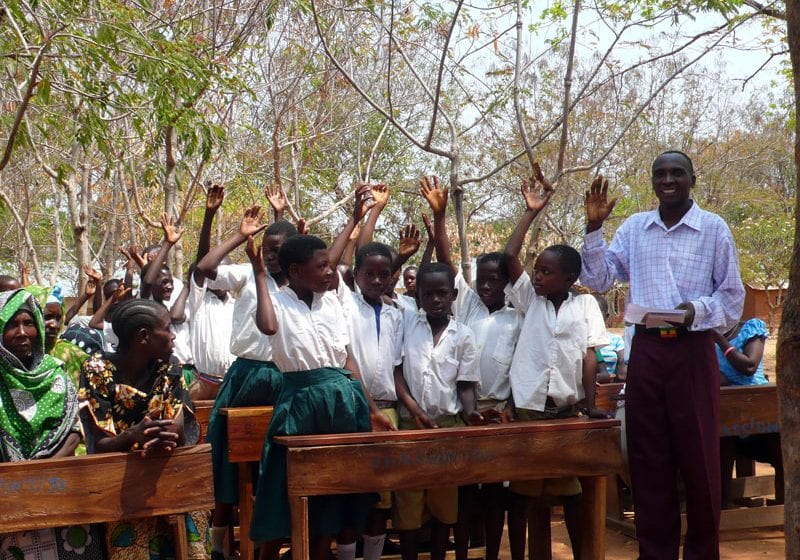The Zimbabwe auction market for flue-cured tobacco defies logic, according to a story by the associate editor of the Manica Post, Obert Chifamba.
Chifamba pointed out that the highest price paid on March 21, the first day of the 2018 marketing season, was US$4.90 per kg.
Of course, he said, many farmers would deliver primings and most of their early-harvested leaves on the first day, which did not necessarily reflect the quality of the crop in its entirety. The best quality tobacco usually found its way to the floors sometime later in the course of the marketing season.
It was obvious that the highest-quality leaf should fetch the highest prices of the season and, logically, those prices had to be higher than the $4.90 recorded on the first day. Yet the sad reality seemed to suggest that as the quality got better, the prices either took a tumble or hit a ceiling – a ceiling of steel or granite.
This price ceiling had in the recent past been the farmers’ biggest undoing. It had driven most farmers to think twice about producing the crop, though most had been unable to make that decision because tobacco was the most rewarding crop at the moment.
The farmers had had to swallow the bitter pill of disappointment and go back to the field year-in, year-out.
The farmers were always driven by the hope that the time for cartels might be nigh, and the fact that they didn’t want to miss out when this eventually happened.
‘Quite a gamble!’ Chifamba said. ‘On the ground the odds have always remained stacked heavily against them.’
Category: Leaf

Market lacks logic

Funding issue festers
The International Labour Organization’s director-general said on Tuesday that he hoped the UN agency would, by the end of this year, resolve the issue of whether or not it should cut ties with the tobacco industry, according to an Agence France Presse story.
“We will be returning to this issue when our governing body next meets in November … and hopefully we can come up with an agreement at that point,” Guy Ryder reportedly told AFP in an interview.
The International Labour Organization (ILO), which is the only UN agency to accept money from the tobacco industry, has justified its industry ties as providing a way of helping improve the working conditions of some of the 60 million people involved in tobacco production worldwide.
AFP reported that, since 2002, the ILO had received more than $15 million from Japan Tobacco International and groups linked to some of the world’s biggest tobacco companies for ‘charitable partnerships’ aimed at reducing child labor in tobacco growing.
But some activists and civil society groups have insisted that tobacco-funded programs have little impact in improving workers’ conditions. They argue that a partnership with a major UN agency was allowing tobacco companies to portray themselves as responsible corporate actors even as their products were killing millions of people each year.
AFP said the ILO’s tripartite structure, which included representatives of employers, labor unions and 187 member states, could make it particularly tricky to reach consensus on difficult issues.
“[T]he employers’ group consider that it is legitimate and proper to continue to maintain financial support from the tobacco industry,” said Ryder, who added that the workers were “more hesitant about that, and the governments are divided”.
Growers exploited
Zimbabwe’s Tobacco Industry and Marketing Board (TIMB) has suspended the operations of flue-cured-tobacco buyers accused of giving growers a raw deal, according to a story in The Daily News.
This follows complaints by growers who say they are being short-changed by some of the buyers.
TIMB spokesperson Isheunesu Moyo has acknowledged receipt of the complaints from the growers. “We have since stopped some firms’ operations … while investigations are being carried out pertaining to the complaints,” Moyo said.
The affected growers claim that some buyers are making unexplained deductions from their payments while others are failing to pay them at all, despite the growers having delivered their tobacco.
Takura Mukomberanwa of Hurungwe West was said to have told the Daily News that growers were calling on the TIMB to look into a “litany of malpractices such as unauthorized insurance deductions”.
Mukomberanwa said that as things stood, it seemed that the TIMB did not care about what growers were going through.
What was happening was defeating the whole purpose of having taken up tobacco growing and suggesting that growers should quit tobacco.
“The amount they are taking from us is just too much and we end up left with virtually nothing, and it does not make economic sense anymore,” he said.
The Daily News said that the complaints about buyers had arisen at a time when the situation at the country’s flue-cured-tobacco auction floors was dire. Many growers were having to spend ‘successive nights at the floors before getting paid for their deliveries.
In addition, during the past few weeks, growers had been unable to withdraw the $300 per day promised by those responsible for such matters.
And this ‘withdrawals crisis’, the paper said, had seen illicit cash dealers relocating from the Central Business District to the auction floors where they targeted desperate growers.
Modest price increase
The prices paid so far this season to Zimbabwe growers for flue-cured tobacco is up by 3.3 percent on that of the previous season, according to a story in The NewsDay.
The newspaper reported that Tobacco Industry and Marketing Board (TIMB) figures indicated that the average price of US$2.81 per kg as of last week was up by US$0.09 per kg on that of the same period of the 2017 selling season, US$2.72 per kg.
The president of the Federation of Farmers Union, Wonder Chabikwa, said the price increase was due to buyers fearing that production was down this season.
Meanwhile, the chief executive of the Zimbabwe Tobacco Association, Rodney Ambrose, said the rate at which the seasonal average was improving had slowed down due to daily prices being slightly below those of 2017.
“As volumes increase and better quality of tobacco comes onto the market, we hope the seasonal average will remain above 2017, whereas in previous seasons the average prices paid to farmers have been on a downward trend against increased costs,” Ambrose was quoted as saying.
He said the worldwide supply of tobacco remained relatively static, while demand continued to decline. But the quality of tobacco on offer in Zimbabwe was better than that of last season, and this should drive the market to pay more.
“Consideration should also be made in the case of Zimbabwe [of] the difference between the international US$ price paid for tobacco and the high local dollar costs,” Ambrose said, before adding that the industry appreciated the 12.5 percent Reserve Bank of Zimbabwe (RBZ) export incentive that would partially assist with the absorption of increased local costs.
“Our appeal to the RBZ remains – allow tobacco farmers direct access to US$ facilities,” Ambrose said. “Any form of additional funding made to support tobacco farming should be channeled towards improving the viability of farmers rather than targeting increased growers, hectares and volumes.”
Sales picking up
Flue-cured tobacco deliveries to Zimbabwe’s auction floors have increased, partly because growers need to raise money for their children’s school fees, according to a story by Elita Chikwati for the Herald.
Boka Tobacco Floors’ operations manager Moses Bias, who confirmed that deliveries to the auction floors had firmed, said that this was a normal trend as schools opened.
“We used to receive an average of 1,700 bales per day during the first days, but now we are getting an average of 6,000 bales per day,” he said.
Bias said the season was going well and that there had not been any challenges with prices.
The Herald story said that growers had sold about 45 million kg of flue cured tobacco for about $125 million, an average price of $2.79 per kg.
As has become normal practice, no indication was given of how this average compares with that of last season.
However, with 70 million kg sold during the 2017 season, the average price stood at 2.76 per kg; and with 60 million kg sold during the 2016 season, the average price stood at US$2.82 per kg.
The highest price paid so far this season at auction was said to have ‘remained’ on US$4.99 per kg, while contract prices had gone beyond US$5 per kg.
The highest contract price paid during the first 30 days of the 2016 selling season was US$6.25 per kg, whereas the highest auction price was US$4.99 per kg.
Grading system questioned
Malawi’s leaf-tobacco grading system should be improved to favor growers, according to a story in the Nyasa Times quoting the chair of the Parliament’s Agricultural Committee, Chidanti Malunga.
The committee has asked the Tobacco Control Commission (TCC) to change its tobacco classification system because, in its view, the current system does not favor tobacco growers.
During a committee visit to the Kanengo Auction Floors on the weekend, Malunga said better prices depended on improving the tobacco classification system, which currently left a lot to be desired.
The Kanengo floors have been hit by low tobacco prices since President Peter Mutharika opened them last week. This is despite estimated production being well below perceived demand.
The story quoted the CEO of the Tobacco Association of Malawi, Mathews Zulu, as saying that low production did not ensure good prices.
Zulu said good prices depended on the production of ‘better leaf’ and improvements in grading.
Prices dip to US$0.80 per kg
Malawi’s tobacco growers will be hoping that the first day of this year’s sales is not a pointer to the rest of the selling season.
According to a story in The Maravi Post, day one was marred by poor prices that came in as low as US$0.80 per kg.
Growers were said to have been angry at the prices buyers were offering.
They compared these prices with the work that went into producing the tobacco and found them wanting.
This year’s selling season was opened on Monday at the Lilongwe Auction Floors by President Peter Mutharika, who urged buyers to pay good prices. But, in the past, even the urgings and threats of presidents have fallen on deaf ears.
The poor start to the season occurred even though Malawi’s all-types crop is thought to be almost 14 percent below demand, due in part to unhelpful weather in some parts of the country. Tobacco production is estimated at 147.80 million kg against a demand of about 171.00 million kg.
Inkonsi Mbwerwa, the board chair of the Tobacco Control Commission, was said to have ‘downplayed’ the low-price concerns, arguing that quality ‘contributes to its prices’.
But, at the same time, the commission was said to be optimistic that Malawi’s tobacco might fetch high prices this year because demand was above the level of supply.
Tobacco marketing is due to start on April 11 at Chinkhoma; on April 16 at Limbe; and on April 23 at Mzuzu.
Prices increased in India
The average price paid to growers for flue-cured tobacco after 25 days of sales on auction floors in the Indian state of Andhra Pradesh was increased by about 1.5 percent on that at the comparable stage of the 2017 sales season, according to a story in the latest edition of the BBM Bommidala Group newsletter.
After the sale of 2.97 million kg of flue-cured tobacco this year, the average price stood at Rs157.31 per kg, up from Rs154.93 per kg last year following the sale of a similar quantity.
Sales which began on March 8, have been held at centers within the Southern Light Soil and Southern Black Soil areas.
They are due to open at the state’s East- and West-Godavari platforms tomorrow.
The Tobacco Board of India increased the authorized Andhra Pradesh crop size to 136 million kg for the 2017-18 season, but production is estimated at 125 million kg.
Meanwhile, flue-cured tobacco auctions are winding down in the state of Karnataka, where 104.79 million kg had been sold after 162 days of sales that started on September 8.
The Board authorized a crop of 99 million kg, but it is expected that it will end up at just over 106 million kg.
The newsletter said that the average price in Karnataka, at Rs139.67 per kg, was up on that of the previous season, but it did not mention by how much.
Flue-cured prices increased
The average grower price for flue-cured tobacco during the first nine days of Zimbabwe’s 2018 marketing season was up by nearly 13 percent on that of the comparable period of the 2017 season, according to a Bulawayo24 story citing figures from a Tobacco Industry and Marketing Board report.
Growers were said to have grossed US$25.8 million from the sale of 8.9 million kg of flue-cured delivered nine days into the 2018 marketing season.
By the same stage of the 2017 season, they had grossed US$26.6 million from the sale of 10.4 million kg.
Contract sales this year have earned US$21.0 million from the sale of about 7.0 million kg, for an average price of US$3.01 per kg.
Meanwhile, auction sales this year have earned US$4.6 million from the sale of 1.9 million kg, for an average price of US$2.42 per kg.
Experts have forecast tobacco output of 200 million kg this year on plantings down from 110,518 ha last season to 104,397 ha this season.
Cry for action on child labor
The global watchdog, Human Rights Watch (HRW), has urged Zimbabwe to take urgent steps to stem child labor and other rights abuses on the country’s tobacco farms, according to a story in The Business Daily.
In a report entitled, Bitter Harvest: Child Labor and Human Rights Abuses on Tobacco Farms in Zimbabwe, the HRW revealed that children as young as 11 were working on tobacco farms, often in hazardous conditions, to earn school fees or supplement family incomes.
Workers were said to be exposed to nicotine and toxic pesticides, and to suffer symptoms consistent with poisoning, such as nausea and vomiting.
“Zimbabwe’s government needs to take urgent steps to protect tobacco workers,” said Margaret Wurth, co-author of the report.
The Business Day reported seasonal workers on some large-scale farms as saying they were pushed to work excessive hours without overtime and forced to go weeks or months without pay.
HRW called on the government to investigate and monitor child labor and human rights violations on tobacco farms.
President Emmerson Mnangagwa has promised to prioritize agriculture as he looks to revive Zimbabwe’s moribund economy.
The HRW report is at: https://www.hrw.org/report/2018/04/05/bitter-harvest/child-labor-and-human-rights-abuses-tobacco-farms-zimbabwe


